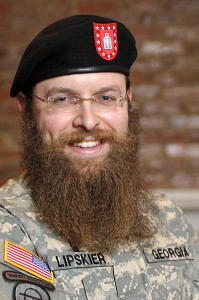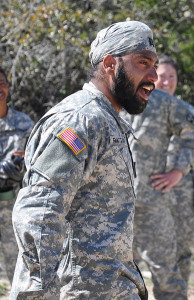Earlier this month, the Pentagon announced it is relaxing dress code rules for religious accommodations. As reported, on a case by case basis, the new policy allows troops to wear religious clothing and other forms of outward expression when they are approved by higher-ups.
 With the relaxed policy, service persons can now wear hairstyles, beards, piercings, or even tattoos that would otherwise be barred. The policy was adapted “to promote the climate necessary to maintain good order and discipline [and] reduce both the instances and perception of discrimination among those whose religious expressions are less familiar to the command.”
With the relaxed policy, service persons can now wear hairstyles, beards, piercings, or even tattoos that would otherwise be barred. The policy was adapted “to promote the climate necessary to maintain good order and discipline [and] reduce both the instances and perception of discrimination among those whose religious expressions are less familiar to the command.”
But not all accommodations will be made — commanders will deny a request if it has an “adverse effect on military readiness, mission accomplishment, unit cohesion, and good order and discipline.” As the Pentagon explained, “religious apparel that ‘impairs’ the safe operation of weapons, poses a safety hazard to others, or interferes with special equipment like helmets and flak jackets will not be permitted.”
 The policy is not limited to any particular organized or recognized religions. NBC News reports that “the military will make every effort to accommodate ‘individual expressions of sincerely held beliefs’ (conscience, moral principles, or religious beliefs) of service members.” Indeed, in speaking to the press, the Pentagon stated that they place “a high value on the rights of members of the Military Services to observe the tenets of their respective religions and the rights of others to their own religious beliefs, including the right to hold no beliefs.”
The policy is not limited to any particular organized or recognized religions. NBC News reports that “the military will make every effort to accommodate ‘individual expressions of sincerely held beliefs’ (conscience, moral principles, or religious beliefs) of service members.” Indeed, in speaking to the press, the Pentagon stated that they place “a high value on the rights of members of the Military Services to observe the tenets of their respective religions and the rights of others to their own religious beliefs, including the right to hold no beliefs.”
Reporters speculate that the policy change came in response to Sikh soldiers’ complaints over discrimination through dress.When it comes to the Constitution, the military receives special legal considerations for curbing traditional notions of free speech and exercise of religion, and challenges to policies are often difficult, if not impossible, to make. The military has also traditionally championed oneness and uniformity as ideal. As a result, many welcome the move as enhancing fundamental rights that would otherwise be difficult to uphold in the military context.
However, Americans United, a group dedicated to the Constitution’s mandate of separation of church and state, issued a more cautious response, saying:
“Americans United fully appreciates the need and value of religious accommodations in the Armed Services. Yet, even as we support religious accommodations, we recognize the equally important and coextensive need to ensure that service members are not subject to coercive religious practices or unwanted proselytizing. Religious freedom means both the right to practice religion and the right to be free from government endorsement and coercion.”
